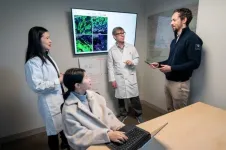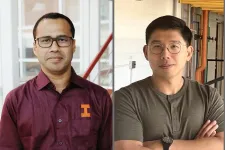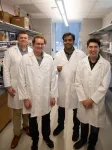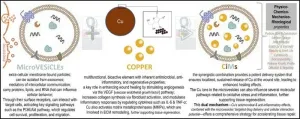Statement on ABMS denying new cardiovascular board
Decision disregards overwhelming support by the broader cardiovascular community for change
2025-02-28
(Press-News.org) American Board of Cardiovascular Medicine Chair Jeffrey Kuvin, MD, issued the following statement in response to the American Board of Medical Specialties denial of an independent board for cardiology:
“We are deeply disappointed with the American Board of Medical Specialties’ decision not to approve the American Board of Cardiovascular Medicine as a new, independent board for cardiology.
The decision ignores the evolution of cardiovascular medicine into its own distinct medical specialty, separate from the field of internal medicine, requiring its own set of knowledge, skills, and competencies to sustain professional excellence and effectively care for cardiovascular patients. In addition, the decision does not acknowledge fundamental change in how clinicians learn information and demonstrate skills throughout their careers.
We feel strongly that the ABCVM met all the criteria required for a new Board, including aligning with the rigorous, recently updated ABMS “Standards for Continuing Certification,” which promote integrated, specialty-specific programs that further a diplomate’s continuous professional development and emphasize improvements in health care quality, safety, value, and competency, rather than a focus on punitive examinations. In addition, the ABCVM application met the expected financial metrics for establishing a new, independent Board with tremendous professional support within the “house of cardiology”, and beyond.
The ABCVM Board of Directors is reviewing options for next steps. In the meantime, we expect that ABMS will listen to the feedback and comments from the cardiovascular community.
We are overdue on rethinking the current approach to assessment and maintenance of competency and look forward to continuing to find new ways to ensure continuous cardiovascular clinical competence in a manner that meets the best interests of cardiovascular physicians and patients, alike.”
About the American Board of Cardiovascular Medicine
As the field of cardiology has evolved into its own distinct specialty, separate from internal medicine, the House of Cardiology felt strongly that having a separate and distinct certifying Board was necessary for sustaining professional excellence and effectively caring for cardiovascular patients. In 2024, the American College of Cardiology, the American Heart Association, the Heart Failure Society of America, the Heart Rhythm Society and The Society for Cardiovascular Angiography & Interventions submitted a formal application to create the American Board of Cardiovascular Medicine (ABCVM) under the American Board of Medical Specialties (ABMS). For more information about ABCVM, visit: https://CVBoard.org.
###
END
ELSE PRESS RELEASES FROM THIS DATE:
2025-02-28
Neuroblastoma is a solid tumor that occurs in children. When high-risk, the disease has a poor prognosis. Decades ago, adding the drug retinoic acid to neuroblastoma treatment increased survival by 10-15%. However, this effect was only evident in post-chemotherapy consolidation after bulky primary tumors had largely been eliminated. Why retinoic acid is effective in this setting but not against primary tumors, has been speculated about for nearly 50 years. St. Jude Children’s Research Hospital scientists resolved the mystery in a new study, showing retinoic acid uses a novel mechanism to kill metastasized neuroblastoma. The drug “hijacks” ...
2025-02-28
COLUMBUS, Ohio – Novel technology intends to redefine the virtual reality experience by expanding to incorporate a new sensory connection: taste.
The interface, dubbed ‘e-Taste’, uses a combination of sensors and wireless chemical dispensers to facilitate the remote perception of taste – what scientists call gustation. These sensors are attuned to recognize molecules like glucose and glutamate — chemicals that represent the five basic tastes of sweet, sour, salty, bitter, and umami. Once captured via an electrical signal, that data is wirelessly passed to a remote device for replication.
Field ...
2025-02-28
URBANA, Ill. – Nanozymes are synthetic materials that have enzyme-like catalytic properties, and they are broadly used for biomedical purposes, such as disease diagnostics. However, inorganic nanozymes are generally toxic, expensive, and complicated to produce, making them unsuitable for the agricultural and food industries. A University of Illinois Urbana-Champaign research team has developed organic-material-based nanozymes that are non-toxic, environmentally friendly, and cost effective. In two new studies, they introduce ...
2025-02-28
ITHACA, N.Y. – When people go along with opinions that go against their better judgment, they feel more culpable for the decision if things go wrong than if they hadn’t received another opinion, new research from Cornell University finds.
The effect may seem counterintuitive, but going against one’s better judgment increases thoughts about better decisions that could have been made, which amplify feelings of control over the situation.
“If you have another person in the ...
2025-02-28
HOUSTON – (Feb. 28, 2025) – A team of researchers at the George R. Brown School of Engineering and Computing at Rice University has developed an innovative artificial intelligence (AI)-enabled, low-cost device that will make flow cytometry ⎯ a technique used to analyze cells or particles in a fluid using a laser beam ⎯ affordable and accessible.
The prototype identifies and counts cells from unpurified blood samples with similar accuracy as the more expensive and bulky conventional flow cytometers, provides results within minutes and is significantly cheaper and compact, making it highly attractive for point-of-care clinical ...
2025-02-28
In a study published today in Biofunctional Materials, Prof. Dr. Haidar, Founder and CEO of BioMAT’X I+D+I LABs in Santiago, Chile, unveils a groundbreaking advancement in dental care: Copper-incorporated microvesicles (CiMs). This innovative technology combines the healing power of copper with microvesicles to enhance tissue regeneration, promote healing, and combat oral diseases. With potential applications in dentistry, cranio-maxillo-facial surgery and beyond, CiMs; a promising leap forward in biomedical technology.
In an exciting breakthrough ...
2025-02-28
NEW YORK, NY (February 28, 2025) -- Primary care practices that employ nurse practitioners (NPs) are more likely to serve socioeconomically disadvantaged communities than practices with no NPs on staff, Columbia University School of Nursing researchers report in JAMA Network Open. Assistant Professor Monica O’Reilly-Jacob, PhD, led the study, published online February 28, 2025.
To better understand the distribution of NPs—who are increasingly critical to improving access to primary care—O’Reilly-Jacob and her colleagues looked ...
2025-02-28
The Texas Tech University Health Sciences Center is conducting a research study that will look at whether calcium, vasopressin, or both early in the course of treatment would help severely injured patients that lose a lot of blood survive their injuries.
The CAlcium and VAsopressin following Injury Early Resuscitation (CAVALIER) trial will include approximately 1,050 people aged 18 to 90. Patients who have traumatic injuries with loss of blood may be enrolled by participating emergency medical personnel during their transportation to the hospital or after arrival to University Medical Center Hospital.
CAVALIER is an Exception from Informed Consent (EFIC) trial, meaning that, the trial ...
2025-02-28
NEWPORT NEWS, VA – Who, or rather what, will be the next top model?
Data scientists and developers at the U.S. Department of Energy’s Thomas Jefferson National Accelerator Facility are trying to find out, exploring some of the latest artificial intelligence (AI) techniques to help make high-performance computers more reliable and less costly to run.
The models in this case are artificial neural networks trained to monitor and predict the behavior of a scientific computing cluster, where torrents of numbers are constantly crunched. The goal is to help system administrators quickly identify and ...
2025-02-28
DALLAS, Feb. 28, 2025 — Cardiovascular disease disproportionately affects Black communities, with more than 57% of non-Hispanic Black adults living with some form of the disease. To drive solutions that address these disparities, the American Heart Association, a global force changing the future of health for all, launched the Heart of Innovation HBCU Challenge to empower the next generation of health tech entrepreneurs from Historically Black Colleges and Universities (HBCUs).
On Monday, Shadrach ...
LAST 30 PRESS RELEASES:
[Press-News.org] Statement on ABMS denying new cardiovascular board
Decision disregards overwhelming support by the broader cardiovascular community for change




